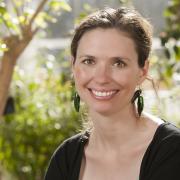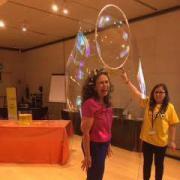A typology of participatory research
Participatory research has emerged as a powerful paradigm, redefining science, education and even citizenship. Especially in the areas of biodiversity observation and nature protection it is a very promising approach for museums and science.
Types of participatory research comprise Action Research, Citizen Science, or Transdisciplinary Research - all will be defined in this workshop. We will showcase examples, discuss how these three kinds of cooperation change the relationships between citizens, stakeholders, and scientific institutions and museums, and explore what the prerequisites are to put participatory research successfully into practice.
Participants will gain an insight into different forms of participatory knowledge production. Findings will be synthesized in a small compendium to support practioners.
Facilitator
Director Public Engagement with Science
Session speakers
Open Science - Lebenswissenschaften im Dialog
Citizen science and participation in research projects have recently gained attention in science and science communication. In Austria the participation of young people has especially been promoted with a specific funding programme for scientists working side by side with young people in scientific research projects. In my talk I will present experiences from two ‘young citizen science’ projects in the life sciences and success factors of transdisciplinary research.
Manager, Urban Barcode Project
Cold Spring Harbor Laboratory
New York City
United States
I will present frameworks and evaluation strategies from two CS projects. The Urban Barcode Program is a science education initiative to engage high school students to study biodiversity using DNA technology. It promotes independent, student-driven research through collaborations with research institutions and schools. For the NYC biome map BioArtists working in residence at a community lab partnered with scientists for a museum street fair, and developed a simple hands-on activity by creating a collective artwork using genetically engineered bacteria as paint.
Research staff, Science in Society Division
Around the globe networks and associations are forming with the aim of supporting Citizen Science, e.g. the Austrian CS network, the European Citizen Science Association, the Citizen Science network China or the Australian Citizen Science association. In my talk, I will explore the role of such practitioner associations for the professionalization of Citizen Science and where dialogue with other participatory methodologies is most needed.
Head of education and public engagement
http://snm.ku.dk/english/
Natural History Museum, Denmark is involved in numerous Citizen Science projects and find ourselves facing a fundamental question: What characterize the cooperation between public engagement dept. and the scientists in different types of CS projects - and in the different phases of a project?
This session will offer a framework for understanding Citizen Science from an organizational point of view and raise questions about how to match museum values with trends in the society and funding agencies.
Wandering LTD was awarded as UNESCO Best Mobile Learning Practice & Mofet Teachers for Teaches Institute in Israel.
I will present a collaborative way to collect scientific data on the thewandering.net platform.
Knowledge is created around physical locations called “stations” - these are different points of interest.
A station is a site with an activity that is to be experienced by visitors in a museum or the citizens of a city.
We collect data around the city that will consist of the number of invading species, the ground temperature .
We will monitor the experience and study the result.





